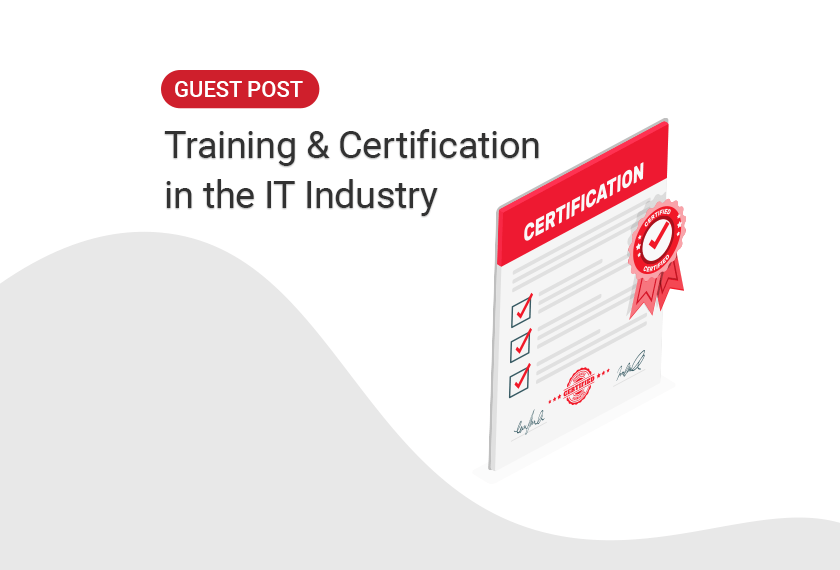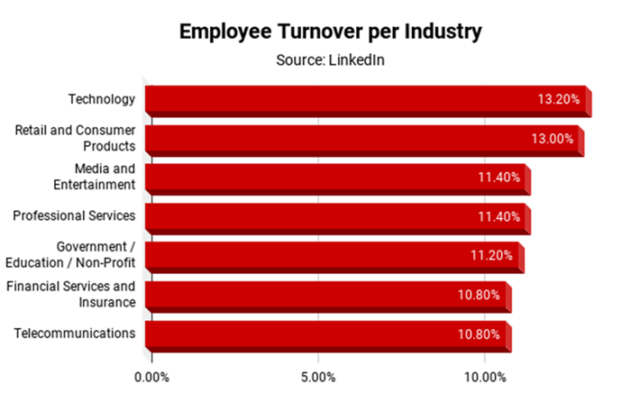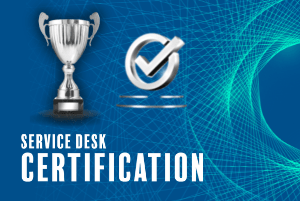
An IT Training Certification showcases the fact that you have a number of desirable technical skills and a good level of knowledge on the subject. It also demonstrates motivation and a desire to succeed within the industry.
There are a number of challenging aspects to an IT Professionals’ role, and the consequences of downtime due to failures, faults or poorly managed change can be devastating to a company. As a result, HR teams are often stringent in their criteria when recruiting IT staff. Recently, we have observed a shift toward prioritising candidates with higher skills certifications.
For the above reasons, obtaining an IT certification is an attractive choice for those who aspire to follow a career path in the IT industry. Looking to get started? Well, this article will explain everything you need to know and the benefits for employees and businesses alike.
What Is an IT Certification?
Simply put, a certification is a document that assures someone is capable of carrying out certain tasks.
An IT training certification proves someone can meet basic responsibilities related to the needs of working in the IT industry. This is necessary if you are to build an effective IT service desk. Like all forms of education, there is variation in the prestige of a particular certificate and in the scope of what a certificate entails, such as a ‘general’ or ‘specialised’ approach. We will cover all of this and more in the following sections.
Why is IT Training Certification Important in the Industry?
Given the time, money, and effort that goes into studying for an IT certificate, you may wonder whether it is worth it. To help you make that decision, we have gathered some of the most important benefits below:
#1 Increased employment opportunities
An IT training certificate will help you even when you’re not in employment.
It allows your résumé to stand out to employers when applying for job openings. Often, employers use IT certificates to benchmark basic skills they would expect to see in an IT staff member. This could help your job search and make your CV stand out in a larger pool of job applicants.
#2 Advancement of your career and possible promotions
IT is an industry with a comparably high percentage turnover of staff members. The reason is that the IT industry is constantly shifting with new modern technologies like AI, RPA, machine learning, and even three-way phone calling, transforming the modern workplace and changing how we work and live. Consequently, businesses are constantly adapting their focus and priorities. As a response, companies often shift their focus and change priorities by searching for the perfect employees that will add new business value.
By obtaining a general IT certification, you level up your status as an indispensable asset. That’s because some courses teach the fundamental skills that experts deem crucial for your chosen career and could form part of your career map. This results in better job retention and career opportunities with your employers.

#3 Builds your professional credibility
The CompTIA research found that 92% of employers believe certifications help to ensure the credibility of IT employees. That’s down to the high standards of integrity maintained by the course coordinators. Additionally, it proves that you are personally driven and motivated enough to complete it.
This could form part of your training plan.
#4 Helps in your professional development
Once you have found an IT job, your training certificate will continue to help you complete your everyday responsibilities. For starters, you will have a more structured approach to learning, getting to grips with the needs of a role in IT faster than the uninitiated. That’s not to mention the skills and shortcuts you will have picked up along the way, making you a more productive employee.
#5 Efficiency and a business’s competitive edge
Finally, the skills learned from an IT training certificate will go a long way toward helping the company you work for. From a business perspective, this makes obtaining a certificate a highly desirable employee attribute. IT certification builds up company credibility, proves the validation of employee knowledge and increases employee confidence.
What’s more, in the IT industry, certification is a great way to establish and advance your professional career. This ultimately benefits IT professionals and organisations, as it supports overall development and growth.
5 Key Steps in Obtaining an IT Certification
Completing an IT certificate is not easy, and it can cost anywhere from £100 to £1000+.
Also, consider that the processes for teaching and assessment will vary depending on the course. You should familiarise yourself with these and compare the criteria that are important to you. Then, follow the general steps below:
- Choose your desired certification
- Undertake the required training?
- Prepare for the exam
- Ace the exam!
- Update your resume or CV
- Start exploring career opportunities
The Best IT Certifications to Earn
Picking your training certificate can be a daunting task in its own right. To help you get started, we’ll cover the basics of some popular programs below:
Entry-level
Are you an IT beginner looking to level your skills to a solid baseline? An entry-level certificate might be the right type of course for you to consider. These exams cover the IT skills and concepts that are essential to kickstart your career. Programs such as ‘Microsoft Technology Associate’ is just one of the many suitable picks for this category.
Once you have completed a foundational-level course, you might want to pursue a specialised certificate from the list below.
Service Desk
The Service Desk is an essential point of contact for support services in an organisation, as it’s the first port of call for any IT issues or requests. It’s also where many IT careers start, so developing your career by becoming a certified Service Desk Manager is a great way to secure high-demand roles and support the rest of your career in IT.
Service Desk Institute is in a unique position as the creator of the globally recognised service desk Professional Standards and partners with People Cert to offer certified qualifications for service desk professionals.
Infrastructure and networking
Specialising in IT infrastructure and networking would allow you to pursue a higher-paying role in network maintenance, an area that is always in high demand. For example, you may be tasked with designing and maintaining network infrastructures, managing hardware and cloud storage or installing and troubleshooting PBX phone systems for small businesses.
Data Analyst
You can learn more about using Python and Excel for data analysis and gain experience in Data Mining and Data Wrangling. Additionally, some courses will teach you how to use time series forecasting, data visualisation and descriptive statistics. Taking some Data Analyst training will help you boost your level of customer support and develop a diverse skill set that is often required to meet the constantly evolving and changing demands of these job positions.
Software development
Most IT courses will touch on aspects of software development, as this is a rapidly growing career. However, if you are looking to become a full-time developer or software engineer, a specialist course will be necessary. There are several software development languages and frameworks available for you to choose from, such as Java, Java Script, React Native, Angular, and NodeJS.
So, if you have an idea of the industry you would like to start working in, make sure to check out some of the developer certification programs that will boost your career.
Project management
Every project needs a leader to see it from concept to completion. In this area, the ‘ITIL 4 Foundation’ is a course that teaches the principles of IT service management. You can expect to learn about standard organisational processes and practices for driving up workflow efficiency. You can check out many courses to improve your project management skills, like PRINCE2 Qualifications, Certified ScrumMaster (CSM) or Certified Project Manager (IAPM) Qualification.
Cybersecurity
These courses focus on teaching cybersecurity skills, like protecting systems from malware and intruders. Whilst this approach is narrower, its application remains vast, with security being high on the list of employer priorities in multiple sectors. For instance, cybersecurity is now one of the eminent IT solutions for the manufacturing industry.
Cloud
Cloud computing has ushered in the age of the SaaS cloud service model. That means that there is a huge demand for both using and maintaining cloud-based software. Many companies are offering certifications in this area; for example, Google Cloud Platform provides a ‘Google Certified Professional Cloud Architect’, Amazon offers ‘The AWS Certified Cloud Practitioner’ course, and Microsoft offers ‘Microsoft Certified: Azure Fundamentals or ‘Salesforce Certified Technical Architects’ provided by Salesforce.
These programs teach the skills you need to use their respective services to a professionally accredited level.
Conclusion
This article has given a basic rundown of IT training certificates. We answered why they are important and what you might get from obtaining them. Remember that many of the benefits listed here translate to an employer’s perspective since having well-trained employees improve a team’s productivity.
Author Bio:
Tanhaz Kamaly – Partnership Executive, UK, Dialpad UK
Tanhaz Kamaly is a Partnership Executive at Dialpad, a modern cloud-hosted business communications platform that turns conversations into the best opportunities, both for businesses and clients via Dialpad telephone numbers. He is well-versed and passionate about helping companies work in constantly evolving contexts, anywhere, anytime. Tanhaz has written for domains such as Track-POD and Not Going To Uni.




























